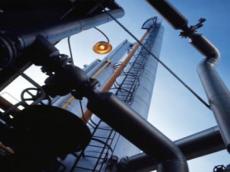|
|
TODAY.AZ / Business
EU sees no obstacles for TransCaspian Project
14 June 2012 [14:35] - TODAY.AZ
 The European Union does not see any political and environmental obstacles to construct TransCaspian gas pipeline through the Caspian Sea, the head of the EU office in Kazakhstan and Turkmenistan Aurelia Bouchez said on Thursday, Novosti-Kazakhstan reported.
The European Union does not see any political and environmental obstacles to construct TransCaspian gas pipeline through the Caspian Sea, the head of the EU office in Kazakhstan and Turkmenistan Aurelia Bouchez said on Thursday, Novosti-Kazakhstan reported."The EU completely supports the ongoing work (on TransCaspian gas pipeline project development), and is already working with the two states which have decided to build a gas pipeline in their territorial waters," Bouchez said at the oil and gas conference "Development of the Caspian Sea Shelf 2012."
The TransCaspian gas pipeline will have a length of about 300 kilometers and be laid on the Turkmen coast of the Caspian Sea. The pipeline will be connected to Azerbaijan where it will link to the South Corridor. Russia opposes the project due to unresolved status of the Caspian Sea, and environmental risks.
Bouchez added that the EU has no specific position on the legal status of the Caspian Sea, because "this matter should be settled between the five littoral states." At the same time, the unresolved status of the Caspian Sea and poses no obstacles for construction and operation of oil and gas pipelines, she said.
"In our opinion there is no need to delimit borders for construction of pipeline through the Caspian Sea. The pipelines can be built through the borders, which of course exist though their status has not been agreed yet. Such problems happen quite often in the EU. In particular, we had some similar problems in the North Sea," Bouchez said.
Moreover, TransCaspian gas pipeline poses no environmental risks, Bouchez said.
"The EU-funded research revealed no environmental problem, which can hamper Trans-Caspian gas pipeline construction," EU representative said.
Meanwhile, the EU is ready to finance the work in this area to solve all possible environmental problems, Bouchez added.
According to the report of British Petroleum (BP), Turkmenistan ranks fourth in terms of the natural gas reserves after Russia, Iran and Qatar. The largest fields are located in the Mary region in the east of the country, Southern Yoloten - Osman (recently merged and renamed to Galkynysh) and Yashlar with shared resources, estimated by local geologists and British GCA within 26.2 trillion cubic meters.
/Trend/
URL: http://www.today.az/news/business/108776.html
 Print version
Print version
Views: 1302
Connect with us. Get latest news and updates.
See Also
- 12 November 2025 [15:16]
Azerbaijani companies participate in Turkmentel-2025 International Exhibition in Ashgabat - 12 November 2025 [12:42]
Azerbaijani mind behind new era of digital trust in American healthcare - 11 November 2025 [13:28]
New digital system simplifies short-term leave approvals in Azerbaijan - 11 November 2025 [12:26]
Nearly half million Azerbaijanis benefited from Employment Programs in 2025 - 07 November 2025 [15:17]
EU: Azerbaijan’s gas exports vital to Europe’s energy independence - 07 November 2025 [10:00]
SOCAR and Sinopec sign framework agreement on energy cooperation - 06 November 2025 [14:59]
Amendments to tax code aim to boost investment, economic activity, says official - 05 November 2025 [15:35]
Azerbaijan to raise social assistance threshold to ?300 as of next year - 05 November 2025 [10:00]
Azeri Light crude oil prices fall - 04 November 2025 [12:36]
Justice Ministry and SMBDA hold meeting with business associations
Most Popular
 Armenian passion for Kazakh wheat
Armenian passion for Kazakh wheat
 Azerbaijani literature section opens at Albanian National Library
Azerbaijani literature section opens at Albanian National Library
 Historic White House visit for Syria’s Sharaa as US pushes for Abraham Accords participation
Historic White House visit for Syria’s Sharaa as US pushes for Abraham Accords participation
 Baku emerges as key pivot in Trump’s vision for new Eurasian economic map
Baku emerges as key pivot in Trump’s vision for new Eurasian economic map
 Brazil launches Amazon transport alliance
Brazil launches Amazon transport alliance
 Azerbaijan hands over COP presidency to Brazil at COP30 opening ceremony
Azerbaijan hands over COP presidency to Brazil at COP30 opening ceremony
 UK deploys personnel and equipment to assist Belgium against mysterious drones
UK deploys personnel and equipment to assist Belgium against mysterious drones
